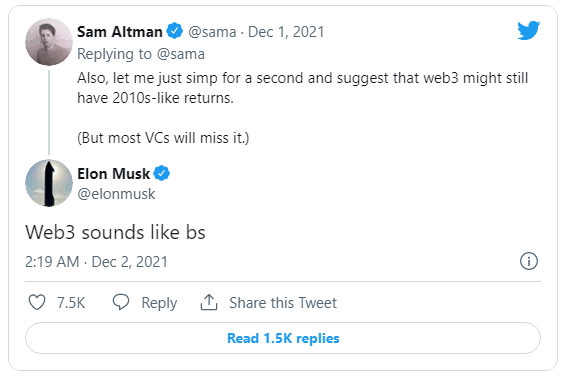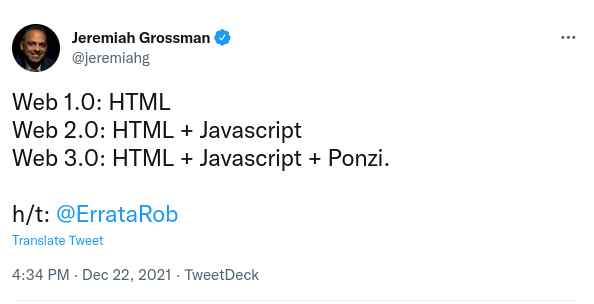A Critical Look at the Future of Web 3.0: Hype or Hope?
Written on
Understanding Web 3.0
The emergence of Web 3.0 is stirring unease among many users, prompting the question: Are we the only ones apprehensive about this new phase of the internet? To some, it feels unreal and problematic.
It's as if the internet is evolving into a more cumbersome version of itself, where even storing a simple integer could incur exorbitant costs. My conviction is that Web 3.0 will mirror our current web experience but with increased sluggishness, leaving personal data vulnerable and permanently etched on the blockchain for public access—a true nightmare scenario.
The reality is that this sentiment has been echoed repeatedly. Despite the skepticism, Web 3.0 is poised to be the next frontier, a future in which humanity is unwittingly dependent on its evolution.
The current landscape of the internet is marked by centralized, capitalistic, and surveillance-driven systems—a troubling state of affairs. Web 3.0 presents itself as a potential remedy, but is it just a mirage?
The Illusion of Web 3.0
Web 3.0 has often been labeled a scam. To dissect this, we can reference the evolution of the internet:
- Web 1.0: Personal websites hosted locally (centralized).
- Web 2.0: Services like Amazon hosting sites (centralized).
- Web 3.0: The community collectively hosting websites (decentralized).
With the current system, users are subjected to algorithms and data exploitation without consent. As artist Banksy noted, Big Tech wields unmatched technological power to manipulate us.
Web 3.0 seeks to disrupt this cycle through decentralization and token-based economies, allowing users to engage without sacrificing their data. Instead of trading privacy for services, users may pay small amounts of cryptocurrency to keep their information private.

The Dangers of Transparency
While Web 3.0 may not entirely liberate us from a Matrix-like existence—given that some blockchain frameworks will remain proprietary—it offers a significant upgrade from our current situation. However, as it becomes mainstream, concerns about privacy mount.
In a world where every action is logged on public ledgers, anonymity is at risk. This notion is only partially accurate.

The real threats stem from centralized internet solutions. For those curious, I recommend exploring the concept of the "Great Reset" or the article "Welcome To 2030: I Own Nothing, Have No Privacy And Life Has Never Been Better," published by the World Economic Forum.
The distinction between centralized and decentralized systems is crucial. Decentralization offers transparency, allowing users to modify and enhance software, potentially reducing surveillance.
Sadly, we seem to be heading toward a harrowing technocratic future, where we face either intrusive centralized systems or decentralized platforms that might preserve our privacy.
The Value Debate of Web 3.0
A primary critique of Web 3.0 and cryptocurrency is the assertion that they lack inherent value, famously presented by Peter Schiff. Simply wishing a currency into existence isn't sufficient; it must be a historically valuable commodity or a widely accepted item in micro-economies.
But what constitutes "inherent value"? Consider language, mathematics, and even air—these all possess value in different contexts. Value is inherently paradoxical, as Plato suggested that rarity lends value to items.
Cryptocurrency, by its nature, is scarce, easily transferable across borders, secured cryptographically, weightless, deflationary, and doesn't require third-party approval. Thus, I'm skeptical of the fear, uncertainty, and doubt surrounding Web 3.0, as its value is manifest—especially when viewed against our current systems.
Final Thoughts
The notion of the American Dream is rapidly evolving. Many individuals require medication just to face the day, and home ownership feels increasingly unattainable due to corporate acquisitions.
For countless Americans, the online world is their last refuge, yet it has devolved into a factory for Orwellian addiction over the past decade.
Without completely dismantling the system and returning to a simpler life—an idea humorously suggested by the Unabomber against Big Tech—I see crypto and Web 3.0 as vital solutions.
Before anyone suggests alternatives, let's be clear: not everyone can abandon technology to become an enlightened sage; we can't count on Big Tech or government entities to prioritize our well-being.
Web 3.0 offers a glimmer of optimism. While it may not be the sole answer, it represents a crucial step forward. The responsibility lies with humanity to correct our misguided, often misanthropic tendencies.
As a final note, I had dreams of becoming a financial advisor, which never materialized. Consequently, I’m not a financial advisor, and I encourage you to conduct your own research rather than relying solely on online opinions. The content herein should not be interpreted as financial advice.
Join over 2000 subscribers on my newsletter for a complimentary copy of my eBook “Mind and Muscle.”
Exploring Web 3.0: Should You Care?
In this video, experts discuss the significance of Web 3.0 and whether it’s worth your attention.
The Exciting Future of Web 3.0 Explained for Beginners
This video breaks down the potential of Web 3.0, making it accessible for newcomers to the concept.